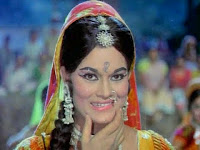 |
| Box art: These are the keeper stills? |
Of course, Harry has tangible evidence of that magical beyond starting at the age of eleven. But Satyawati, our heroine and the true believer of Jai Santoshi Maa, has nothing but her unshakeable faith that the goddess Santoshi will solve her problems if Satyawati worships with sufficient devotion.
You can probably see where this is going. Obviously, in order for Santoshi to reward Satyawati in the most satisfying possible manner, Satyawati must first suffer the slings and arrows of outrageous fortune—the more outrageous the better.
Jai Santoshi Maa takes place simultaneously in heaven among the Hindu gods and on earth in a timeless, filmi version of India. In heaven, Santoshi is the wished-for sister conjured up by Ganesha’s sons; on earth, the motherless Satyawati (Kanan Kaushal) ardently worships the goddess. First Satyawati wishes for a husband, and she falls for the handsome flute-playing Birju (Ashish Kumar) when she meets him once in passing. When he is summoned to play and sing at a temple ceremony honoring Santoshi, she sees that Birju is truly the man for her.
He admires her from afar. But on the way home from the ceremony, Satyawati is jumped by a dreadful dacoit and his leering gang (in a very creepy scene that drives home what life must be like for many a rural Indian girl whose back isn't being omnisciently watched). Birju saves her in the nick of time, and then it’s clear to both of them that they have already spent many lifetimes together.
 |
| Bela Bose is up to something. |

Meanwhile, in heaven, the Big Three goddesses Laxmi, Durga, and Brahmini become jealous of the attention Santoshi is getting from Satyawati. They determine to make Satyawati’s life perfectly miserable and force her to renounce her devotion to Santoshi. To that end, the goddesses ensure that the sisters-in-law drive Birju out of the house (by means of the aforementioned leftovers, which suggests that I’ve been shockingly insulted over and over again since childhood without knowing it), then raise a storm that nearly drowns him as he travels around looking for work, then give him amnesia so that he forgets Satyawati—waiting patiently at home enduring terrible abuse and poverty—and starts to fall for another woman.
You’d think that Santoshi might take up arms against Satywati’s sea of troubles somewhat earlier in the game since the goddess is herself the object of jealousy and derision in heaven. It’s as if the devi and her devotee were new girls in parallel high schools populated by mean girls, and we wait—as in life—for the cruel ones to get their richly deserved comeuppance. But the goddess bides her time, and so things go from bad to worse for her loyal follower. Finally, Satyawati, whose long fasts have given her raccoon eyes like an Edward Gorey flapper, is so downtrodden that she can’t even buy the grams and jaggery necessary for her final Santoshi puja. Santoshi comes to earth in the guise of an old woman (clang! go the cymbals as she is edited abruptly into the scene) and presents weeping, starving Satyawati with the offering.
The film isn’t finished with us yet, even though Birju returns (now rich, having learned the jeweler’s trade and apparently forgotten his wish to be a musician) and Satyawati becomes the luxuriously dressed wife of a prosperous independent household. The mean-goddess triumvirate and the odious bhabhis—now jealous of Satyawati’s good fortune, because it’s always something—are still hoping to get the last word. They get their chance when Satyawati invites everyone to a big celebration in honor of Santoshi. (Check out Bela Bose here, pretending she’s joining in wholeheartedly—but noooo!)
Bela Bose and her henchwoman sneak off and squeeze limes into the food (a no-no for a Santoshi puja, apparently), which causes all the children eating at the festival to drop dead (!!!). The families blame Satyawati—her anger at her mistreatment, they claim, caused her to poison the children of her former tormentors—and things look blacker than ever before in Satyawati’s gloomy life until FINALLY Santoshi puts in a personal appearance, resurrects the dead kids, makes the guilty bhabhis confess, and sets the throng of onlookers cheering her power and her devotee’s spotless perfection. In heaven, the mean goddesses apologize for their misdeeds. All is again right with the world.
 |
| Can't get no satisfaction. |
It’s said that Santoshi was but a minor goddess before this film stormed the box office, but fans (many of them women who presumably found that this story spoke to them in ways that Sholay and Deewaar didn’t) treated the theaters as temples and bowed before the onscreen goddess, which was enough to move her to a more important place in the pantheon. I love when religion bends to the will of humans instead of the other way around.
_Jimmy_Stewart_RARE_STUDIO_PROMO_Signed___556.jpg) |
| As Real as the Velveteen Rabbit. |

No comments:
Post a Comment